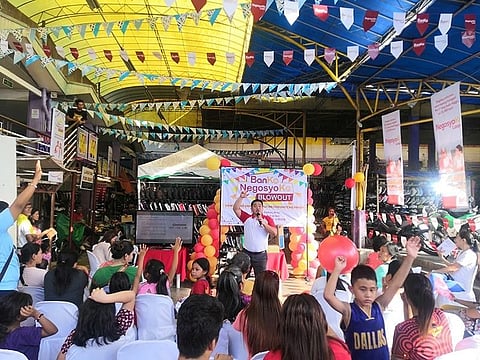

LEVEL of financial management and resilience among self-employed, micro-entrepreneurs (SEMEs) is still considered low.
This is according to a study, titled Financial Performance of Micro, Small and Medium Enterprises (MSMES) in the Philippines, by Rufo R. Mendoza of the Asian Institute of Management.
But how do we make MSMEs enjoy financial freedom?
Teaching micro-business owners the value of managing finances sustainably is one of the current thrusts of BPI BanKo Direct Inc., a subsidiary of Bank of the Philippine Islands (BPI).
For instance, BPI BanKo Direct has an ongoing caravan nationwide dubbed as Banko Palengke Caravan, gathering their existing and potential clients for a day of pampering and financial resiliency training. The Davao City-leg was held on October 22 at the Bankerohan Public Market.
BPI Direct BanKo's head of Microfinance Loan Rodolfo K. Mabiasen Jr. told SunStar Davao in an interview that financial resiliency training among SEMEs is crucial in sustaining and growing their enterprises.
BPI BanKo Direct gives SEMEs easy access to financing through its Negosyo Ko Loan program wherein small businessmen can loan from a minimum amount of P25,000 up to P300,00 with an interest of 2 to 2.3 percent depending on the amount.
"We cannot just lend money, we understand that when we lend them, we have to be able to guide them on how to use their loan money wisely. Aside from facilitating the loan processing, we also provide advice, it comes with a form of financial education especially during loan release," he said.
He added they usually instruct loaners on payment scheduling and putting aside money for savings and investment.
Blending personal and business funds
Mabiasen said that among the common concerns of micro-entrepreneurs with their finances is mixing personal funds with business funds.
"Most of our SEMEs clients are not business graduates, part of what we do, we check their cash flows and help them know how their business is doing, we tell them how much they should be able to allot for loan payments and how much for savings," he said.
Where to put the money
Another dominant issue among SEMEs is their limited knowledge on where to put their money, leading some to invest on pyramiding and other forms of illegitimate investment schemes.
"Because they are not aware of different financial services given by legitimate financial advisers, they tend to be more swayed when it comes to scams on investments. If somebody promises a big return of money, they tend to believe it because they don't have a lot of exposure on financial services or instruments available on banks and other financial institutions like insurances," Mabiasen said.
Mabiasen said they teach SEMEs on how to properly invest and save their hard-earned money because their source of income -- their businesses -- are dependent on many factors.
"Their income is not like a salary where they get a fixed income monthly, they are dependent on a lot of factors, more predominantly, market factors but can also be affected by weather and other phenomenon. Business is risky, so we want their money to be put where it is safer and stable," he said.
Mabiasen said one client who is now considered financially resilient and literate is microbusiness owner Arlene Bucay.
Bucay, owner of a salon in Ilustre St., was able to expand her business by availing himself of bank loans and saving money through a legitimate bank.
"Nagloan ko pero naa jud tumong akong pagpangutang. Akong giinvest pagpalit og mga medisina sa parlor (I loaned money but I always make sure that I borrow money with a purpose. I invested it by buying hair treatments for my parlor)," she said.
Bucay said she was able to borrow P50,000 up to P90,000 from the bank for three years.
"Naa koy savings sa bank and insurances. I save because just in case my business will be on the rocks, naa miy savings, dili mi mabitin sa atong mga obligasyon (I also have savings accounts and insurances from financial institutions. I save money because we don't know what will happen to my business in the days ahead, it's better to be prepared so that we can still meet our obligations in the family)," the parlor owner said.
Bucay earns P3,000 on lean season and P12,000 on peak season daily.